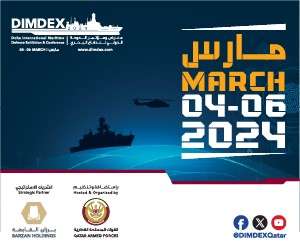|
|
| a |
Focus - U.S. Navy ’s Mobile Landing Platform (MLP) |
| |
|
| |
| |
Focus:
U.S. Navy’s Mobile Landing Platform Demonstrates Key Capabilities |
| |
Published on the official blog of the United States Navy By Captain
Henry Stevens, Strategic and Theater Sealift Program Manager, Program
Executive Office, Ships
Over months of at-sea testing, USNS Montford Point (MLP 1), the first
ship of our Navy’s class of Mobile Landing Platform (MLP) demonstrated
exceptional capabilities and inherent flexibility during her participation
in a series of Post-Delivery Tests and Trials (PDT&T) events. These
events, held in the Pacific Northwest and Southern California, successfully
evaluated and demonstrated the performance of the ship and her systems.
We applaud the ship and her crew. |
|
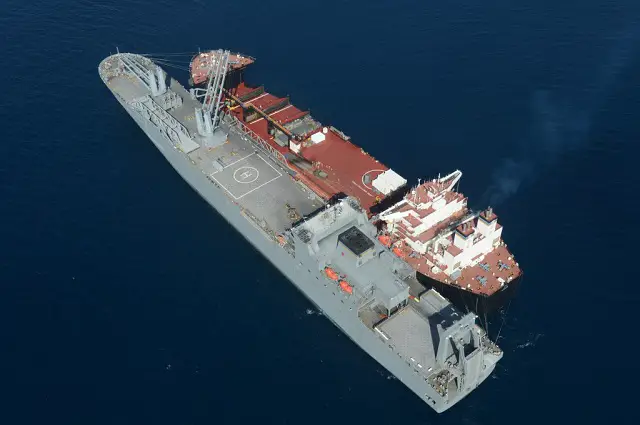
USNS Montford Point (MLP 1) and vehicle cargo ship USNS Bob Hope (T-AKR
300) are moored alongside of each other during vehicle transfer operations.
|
|
PDT&T
began on Montford Point in April 2014, following installation of her
Core Capabilities Set (CCS) and in advance of achievement of the ship
class’ Initial Operating Capability (IOC), which we look forward
to declaring in April 2015.
The images below highlight many of PDT&T events in which Montford
Point participated, including the Initial Operational Test and Evaluation
(IOT&E) end-to-end event, designed to determine the operational
effectiveness and suitability of the program. Directly following completion
of the end-to-end event, and without pulling into port, Montford Point
showcased her capabilities during the Fleet’s Pacific Horizon
2015, a week-long scenario-driven humanitarian assistance and disaster
relief exercise.
Throughout the course of these tests and exercises, Montford Point demonstrated
many of her capabilities by interfacing with prepositioning ships and
the Improved Navy Lighterage System (INLS) to offload equipment and
supplies for transshipment to shore by Landing Craft Air Cushion (LCAC).
These capabilities are the cornerstone of our Navy’s seabasing
strategy, further enabling large-scale logistics movements from sea
to shore forces and prepositioned Marine Corps equipment from the Sea
Base to the shore, significantly reducing dependency on foreign ports. |
|
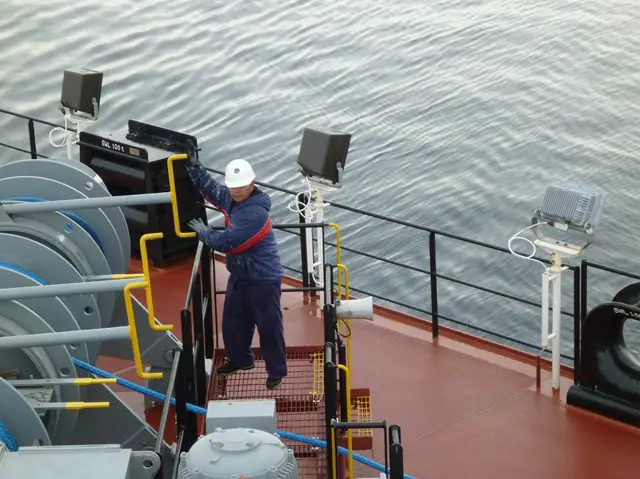
A crew member of Montford Point secures the ship’s aft lines as
part of the initial mooring operations with Bob Hope.
|
|
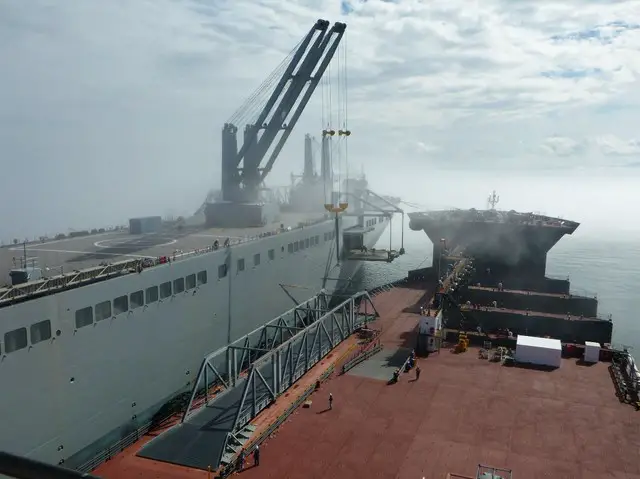 Following completion of the mooring process, the starboard side-port
platform of Bob Hope is deployed and lowered.
Following completion of the mooring process, the starboard side-port
platform of Bob Hope is deployed and lowered.
|
|
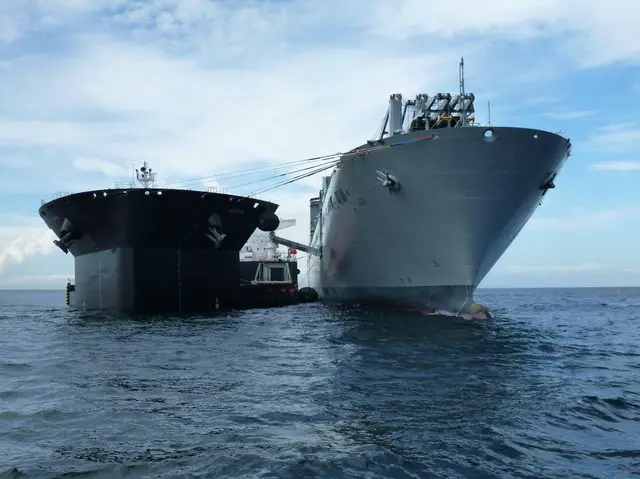 With the initial mooring evolution complete, preparations are made to
raise the Vehicle Transfer Ramp (VTR) of Montford Point (L) to connect
with the platform of Bob Hope (R).
With the initial mooring evolution complete, preparations are made to
raise the Vehicle Transfer Ramp (VTR) of Montford Point (L) to connect
with the platform of Bob Hope (R).
|
|
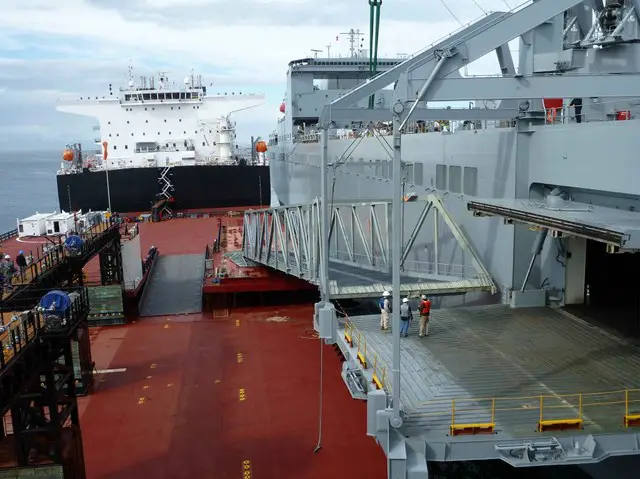 The VTR of Montford Point is raised and fitted to the ramp of Bob Hope
to allow for the transfer of vehicles between the two ships.
The VTR of Montford Point is raised and fitted to the ramp of Bob Hope
to allow for the transfer of vehicles between the two ships.
|
|
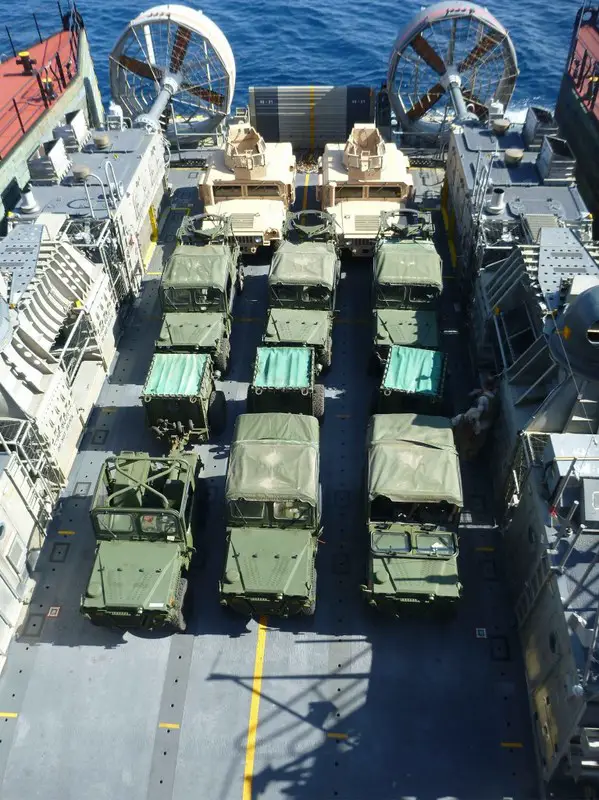
During retrograde operations, vehicles are transported onboard a Landing
Craft Air Cushion (LCAC), to be transferred from Montford Point onto
Bob Hope. The vehicles include, two M88 Armored Recovery Vehicles (ARV),
three Internally Transportable Vehicle-Light Strike Vehicles (ITV-LSV),
three Internally Transportable Vehicle-Prime Movers with Ammo trailer
(ITV-PM/AT), and three Armored High Mobility Multipurpose Wheeled Vehicle
(HMMWV) Expanded Capacity Vehicles (ECV).
|
|
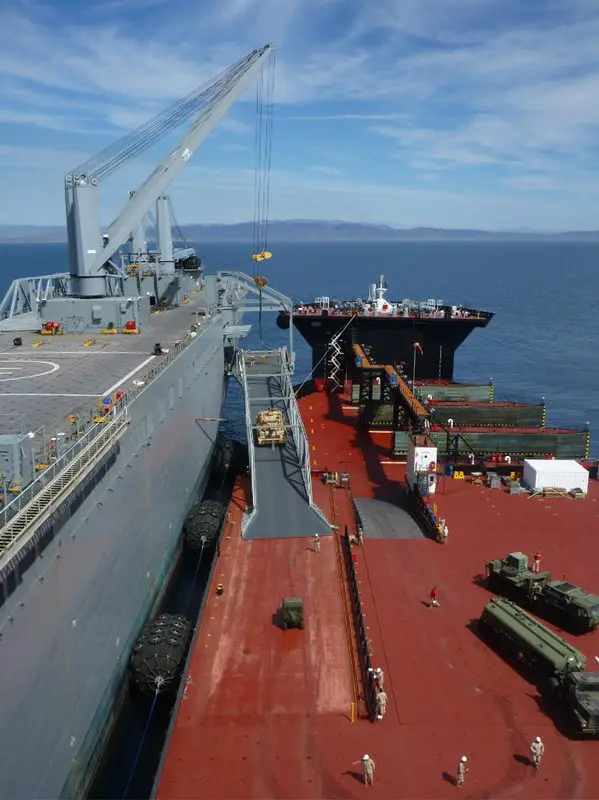
Following its offload from the LCAC, an M88 ARV transits on the Raised
Vehicle Deck (RVD) and up the VTR to be transferred onto Bob Hope. An
ITV-PM, a M970 Refueling system, and a Logistic Vehicle System Replacement
(LVSR) Wrecker prepare to transit following the ARV.
|
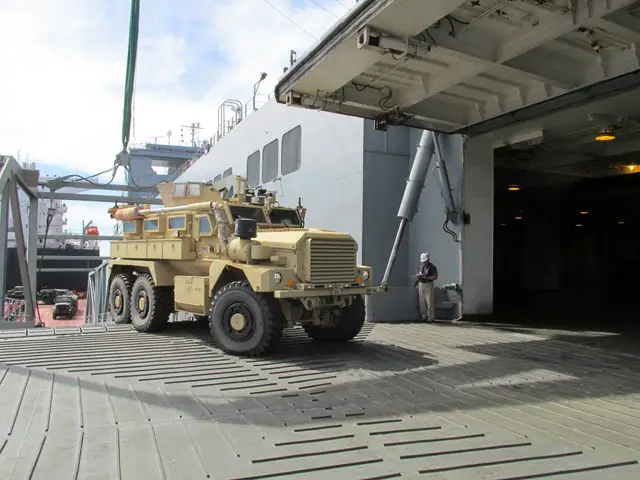
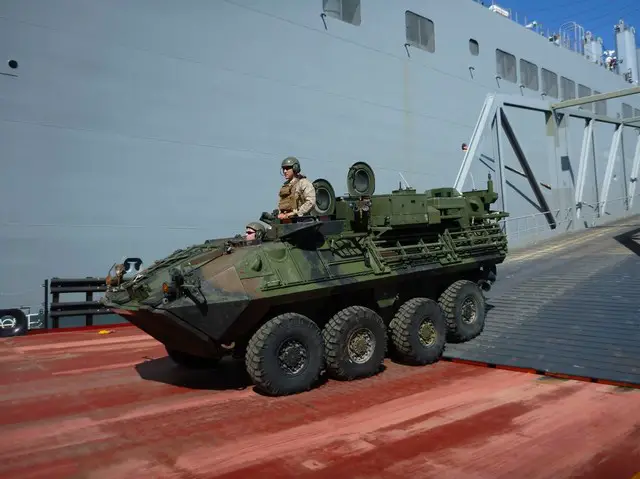
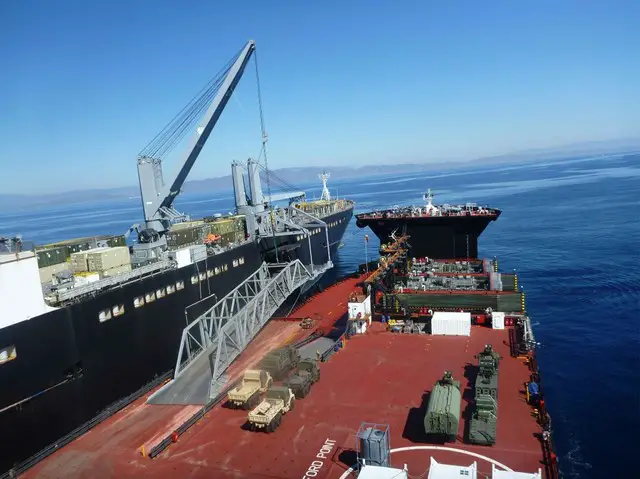
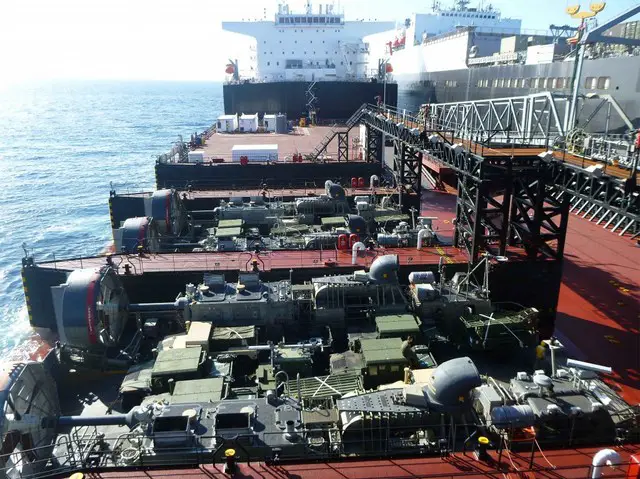
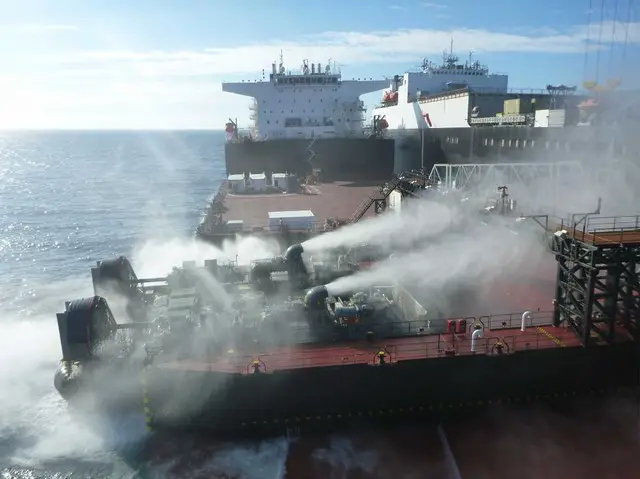
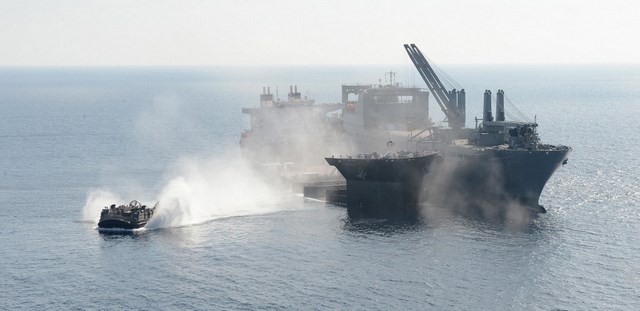

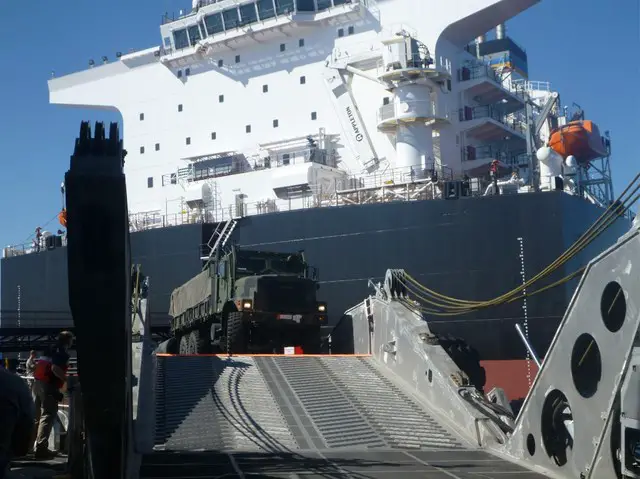
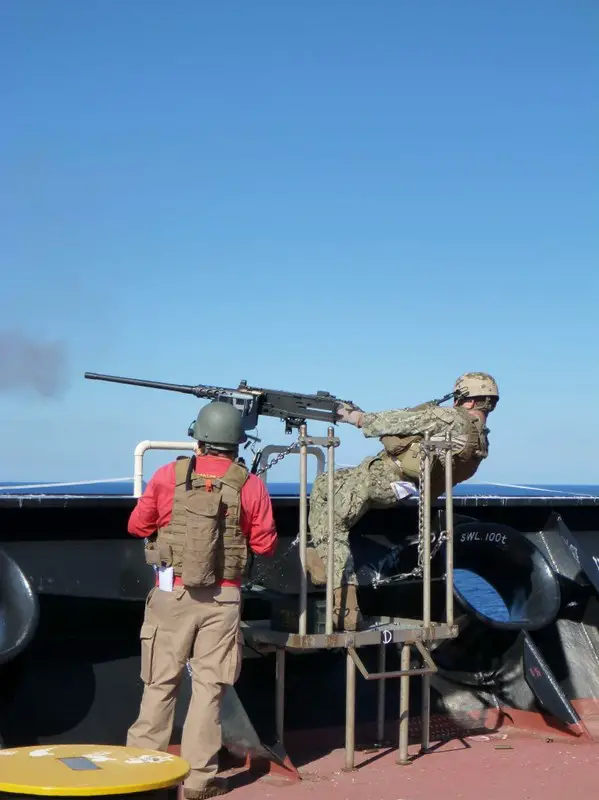





 Following completion of the mooring process, the starboard side-port
platform of Bob Hope is deployed and lowered.
Following completion of the mooring process, the starboard side-port
platform of Bob Hope is deployed and lowered. With the initial mooring evolution complete, preparations are made to
raise the Vehicle Transfer Ramp (VTR) of Montford Point (L) to connect
with the platform of Bob Hope (R).
With the initial mooring evolution complete, preparations are made to
raise the Vehicle Transfer Ramp (VTR) of Montford Point (L) to connect
with the platform of Bob Hope (R). The VTR of Montford Point is raised and fitted to the ramp of Bob Hope
to allow for the transfer of vehicles between the two ships.
The VTR of Montford Point is raised and fitted to the ramp of Bob Hope
to allow for the transfer of vehicles between the two ships.

